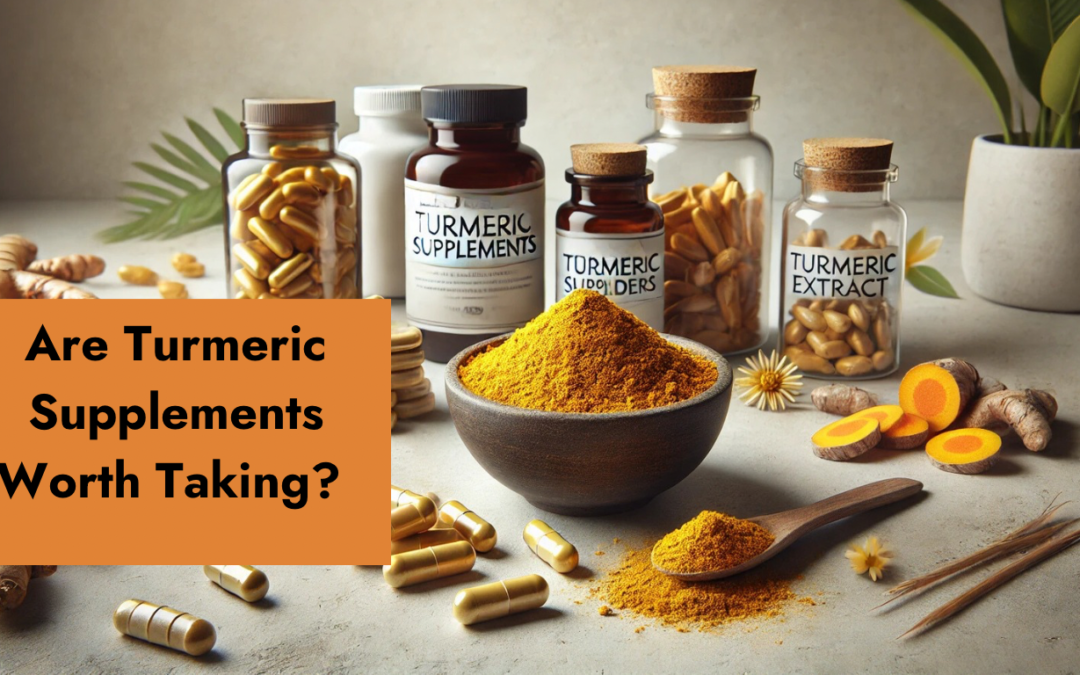Turmeric, a golden-hued spice derived from the root of the Curcuma longa plant, has long been celebrated in Ayurvedic and traditional Chinese medicine for its healing properties.
In recent years, turmeric supplements have gained significant popularity for their purported health benefits.
But are they really worth taking? Let’s dive deep into what turmeric supplements are, their benefits, potential side effects, and whether they’re a worthwhile addition to your routine.
What Are Turmeric Supplements?
Turmeric supplements are health products made from turmeric root (Curcuma longa), a bright yellow spice commonly used in cooking and traditional medicine.
These supplements are designed to provide concentrated doses of curcumin, the active compound in turmeric responsible for most of its health benefits.
In turmeric root, curcumin is present in small amounts (about 3-5%), which makes it difficult to consume enough through diet alone to achieve therapeutic effects.
Turmeric supplements are formulated to address this, offering a potent and convenient way to reap the benefits of curcumin.
Forms of Turmeric Supplements
Turmeric supplements come in several forms, including:
Capsules or Tablets
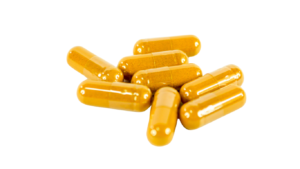
-
- The most common form, easy to take, and pre-dosed.
Powder
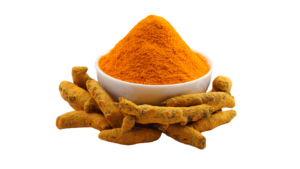
-
- A versatile form that can be added to smoothies, teas, or recipes.
Liquid Tinctures
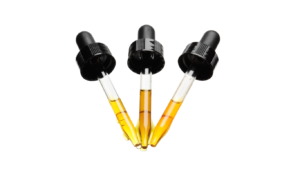
- Highly concentrated and quickly absorbed.
Softgels with Oils
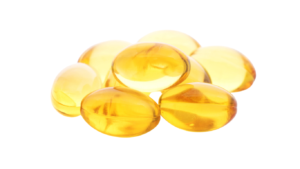
-
- Combined with fats like coconut oil to improve absorption.
Related Read: How to Use Turmeric in your Daily Diet
Key Ingredients in Turmeric Supplements
While the primary ingredient is turmeric or curcumin extract, many supplements include additional components to enhance their effectiveness:
- Black Pepper Extract (Piperine): Increases curcumin absorption by up to 2000%.
- Phospholipids or Liposomes: Improve bioavailability by helping curcumin pass through the digestive system more efficiently.
- Other Herbs and Nutrients: Some formulations include ginger, boswellia, or vitamin D for synergistic effects.
Potential Benefits of Turmeric Supplements
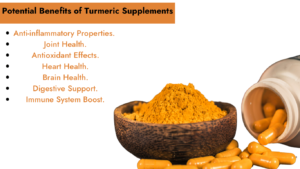
- Anti-Inflammatory Properties
Chronic inflammation is linked to numerous health issues, including heart disease, arthritis, and cancer. Studies suggest curcumin may suppress key inflammatory markers like cytokines, helping to reduce inflammation naturally. - Joint Health
Turmeric supplements are often recommended for those with osteoarthritis or rheumatoid arthritis. Research shows curcumin may alleviate joint pain and improve mobility, rivaling the efficacy of some over-the-counter pain relievers. - Antioxidant Effects
Curcumin is a potent antioxidant that neutralizes free radicals and enhances the body’s own antioxidant enzymes. This may reduce oxidative stress, which contributes to aging and chronic diseases. - Heart Health
Curcumin supports cardiovascular health by improving endothelial function (the lining of blood vessels) and reducing inflammation and oxidation, both of which are major contributors to heart disease. - Brain Health and Cognitive Function
Curcumin may increase levels of brain-derived neurotrophic factor (BDNF), a protein that supports the growth of neurons and combats degenerative processes in the brain. This has led to interest in its role in preventing Alzheimer’s disease and improving memory. - Digestive Support
Traditionally, turmeric has been used to treat digestive disorders. It may alleviate symptoms of irritable bowel syndrome (IBS) and inflammatory bowel diseases like Crohn’s and ulcerative colitis. - Immune System Boost
Its anti-inflammatory and antimicrobial properties may help strengthen the immune system and fend off infections.
Related Read: What are the Benefits of using Turmeric in Beauty Products
Considerations Before Taking Turmeric Supplements
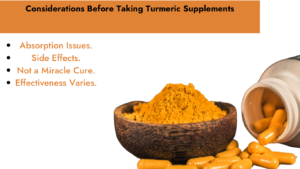
While turmeric supplements have significant potential benefits, they may not be suitable for everyone. Here are some important things to consider:
- Absorption Issues
- Curcumin, the active ingredient in turmeric, is poorly absorbed by the body on its own. Many supplements include black pepper extract (piperine) to enhance curcumin’s bioavailability. Without such an addition, the body might not absorb curcumin effectively, limiting its benefits.
- Side Effects
- While generally safe for most people, turmeric supplements may cause side effects, especially at high doses. Some potential issues include gastrointestinal discomfort, nausea, or diarrhea.
- People on blood-thinning medications or those with gallbladder issues should consult a healthcare professional before using turmeric supplements.
- Not a Miracle Cure
- While turmeric supplements have demonstrated promising health benefits, they’re not a replacement for a healthy diet or lifestyle. A well-balanced diet, exercise, and stress management are crucial to overall health. Supplements should be viewed as a complementary tool, not a cure-all.
- Effectiveness Varies
- The effectiveness of turmeric supplements can vary depending on factors like the quality of the supplement, the dose, and individual body responses. Not everyone will experience the same benefits, and it’s important to set realistic expectations.
Are There Any Side Effects?
While turmeric is generally safe for most people, high doses of supplements may cause:
- Gastrointestinal issues: nausea, diarrhea, or bloating.
- Allergic reactions: skin rashes or irritation.
- Blood-thinning effects: Turmeric may interfere with blood-clotting medications, increasing the risk of bleeding.
- Gallbladder issues: People with gallstones or bile duct obstruction should avoid turmeric supplements.
It’s crucial to consult a healthcare provider before starting turmeric supplements, especially if you’re pregnant, breastfeeding, or taking medications.
How to Choose the Right Turmeric Supplement
- Look for Standardized Curcumin Content: Ensure the supplement contains at least 95% curcuminoids.
- Bioavailability Enhancers: Opt for supplements that include black pepper extract (piperine) or liposomal formulations to enhance absorption.
- Third-Party Testing: Choose products tested for purity and potency by reputable organizations like NSF or USP.
- Dosage: Most studies use doses between 500-2000 mg of curcumin daily. Start with a lower dose and gradually increase as needed.
Are Turmeric Supplements Worth Taking?
Turmeric supplements may be worth taking if:
- You suffer from chronic inflammation or joint pain.
- You’re looking to boost your antioxidant intake.
- You have specific conditions that turmeric may alleviate, such as arthritis, IBS, or cognitive decline.
However, supplements should complement a healthy lifestyle, not replace it. Eating a balanced diet, exercising regularly, and managing stress are essential components of overall well-being.
Final Thoughts
Turmeric supplements offer a concentrated dose of curcumin, which may provide significant health benefits, particularly in reducing inflammation and supporting joint, brain, and heart health. While they’re not a one-size-fits-all solution, they can be a valuable addition to your wellness regimen if used responsibly.
As with any supplement, it’s essential to do your research, choose high-quality products, and consult a healthcare professional to ensure they’re safe and effective for your individual needs.
Disclaimer: This article is for informational purposes only and does not constitute medical advice.

